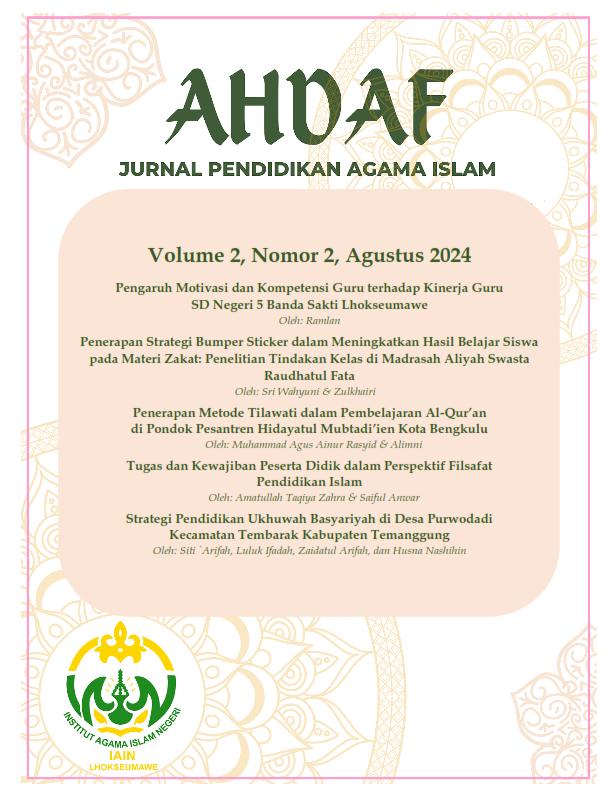Pengaruh Motivasi dan Kompetensi Guru terhadap Kinerja Guru SD Negeri 5 Banda Sakti Lhokseumawe
Main Article Content
Ramlan Ramlan
This study aims to determine the partial effects of (1) motivation on teacher performance, (2) competence on teacher performance, and (3) the combined effect of motivation and competence on teacher performance. The research was conducted at SD Negeri 5 Banda Sakti using a quantitative method, with data processing techniques multiple regression analysis. The sample was collected using the total sampling technique, with the entire population of 30 teachers included in the sample. Data was gathered using a Likert-scale questionnaire. The findings showed that, partially, (1) the direct effect of motivation on teacher performance was 27.4; and (2) the direct effect of competence on teacher performance was 22.0. Simultaneously, the combined effect of motivation and competence on teacher performance was 43.50, while the remainder was influenced by other factors not examined in this study. The research recommends that synergy between motivation and competence should be fostered through comprehensive development programs, while teacher welfare must also be addressed to maintain their commitment. Regular performance evaluations are necessary to identify further development needs, and additional research is suggested to explore other factors affecting teacher performance.
Badan Pusat Statistik. (2020). Statistik Pendidikan 2020. Badan Pusat Statistik.
Colquitt, Jason A., Jeffery A. Lepine, and M. J. W. (2015). Organizational Behavior: Improving Performance and Commitment." Organizational Behaviour. McGraw-Hill Education.
Dahlan. (2010). Manajemen Pendidika. Rineka Cipta.
Erlanda, Nina, Saiful Bahri, and S. S. (2024). Pengaruh Kompensasi, Motivasi, Sarana dan Prasarana terhadap Kinerja Guru Sekolah Dasar. Journal of Education Research, 5(4), 2355–4361. https://www.jer.or.id/index.php/jer/article/view/1575/861.
Fahmi, I. (2016). Pengantar Manajemen Sumber Daya Manusia: Konsep dan Kinerja. Jakarta: Mitra Wacana Media, 25.
Goss-Sampson, M. A. (2019). Analisis Statistik Menggunakan Jasp: Buku Panduan untuk Mahasiswa. University of Greenwich. https://doi.org/10.6084/m9.figshare.9980744.
Hasan, A. (2008). Kompetensi Profesional Guru. Remaja Rosdakarya.
Ilyas. (2022). Strategi Peningkatan Kompetensi Profesional Guru. Jurnal Inovasi, Evaluasi Dan Pengembangan Pembelajaran (JIEPP), 2(1), 34–40. https://doi.org/10.54371/jiepp.v2i1.158.
Mangkunegara, A. P. (2011). Manajemen Sumber Daya Manusia Perusahaan. Bandung: PT. Remaja Rosdakarya.
Mumtaz, S., & Rindanigsih, I. (2023). Faktor-Faktor yang Mempengaruhi Kinerja Guru: Literature Review. Academic Journal Research, 1(1), 48–57. https://doi.org/10.61796/acjoure.v1i1.12.
Nurla, Y., Al Munawwarah, R., Mustafa, H., & Sani, A. (2021). Pengaruh Kemampuan Intelektual dan Motivasi Kerja terhadap Kinerja Guru SMK Negeri 4 Soppeng. Amkop Management Accounting Review (AMAR), 1(1). https://doi.org/10.37531/amar.v1i1.127.
Peraturan Menteri Pendidikan dan Kebudayaan (Permendikbud) Nomor 23 Tahun 2013 pasal 2 ayat (2) poin 5.
Rivai, V., & Basri, A. F. M. (2005). Performance Appraisal: Sistem yang Tepat untuk Menilai Kinerja Karyawan dan Meningkatkan Daya Saing Perusahaan. PT. RajaGrafindo Persada.
Robbins, S. P. (1996). Perilaku Organisasi (Edisi ke-7). Prehallindo.
Sugiyono. (2015). Metode Penelitian Pendidikan Pendekatan Kuantitatif,Kualitatif, dan R&D. Alfabeta.
Undang-Undang RI Nomor 14 Tahun 2005 tentang Guru dan Dosen
Veirissa, A. H. (2021). Kualitas Guru di Indonesia. Prosiding Seminar Nasional Pascasarjana, 4(1), 267–272. https://proceeding.unnes.ac.id/snpasca/article/view/861.
World Bank. (2023). Country Reports and Education Statistics. World Bank.








